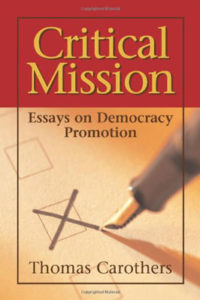 While the new U.S. Congress will face deep divides on many issues, it does have a chance to act on one issue upon which both sides broadly agree: supporting democracy abroad, according to a new analysis from the Carnegie Endowment’s Democracy, Conflict, and Governance Program.
While the new U.S. Congress will face deep divides on many issues, it does have a chance to act on one issue upon which both sides broadly agree: supporting democracy abroad, according to a new analysis from the Carnegie Endowment’s Democracy, Conflict, and Governance Program.
The new Congress will be well positioned to show leadership on this front, say analysts Thomas Carothers and Frances Z. Brown:
Several incoming and incumbent members boast expertise on global democracy issues, and the new class features a historically diverse, multicultural makeup that (more closely) reflects American democratic ideals. Lawmakers looking to prioritize U.S. democracy policy can draw on a bipartisan reservoir of public support for these ideals. In 2018, the George W. Bush Institute, Freedom House, and the Penn Biden Center found that 71 percent of Americans favor “the U.S. government taking steps to support democracy and human rights in other countries.”
 Lawmakers can rise to the challenge in three ways, Carothers and Brown contend:
Lawmakers can rise to the challenge in three ways, Carothers and Brown contend:
1) Enact creative legislation to punish autocrats. … One idea could be to limit foreign assistance to countries whose leaders get rid of constitutional term limits. There is already a model for this: the long-standing Foreign Assistance Act provision that cuts off non-humanitarian aid to countries whose elected government is deposed by a military coup. Ideally, cuts should focus on the aid that autocrats value most: security sector assistance.
2) Support pro-democracy diplomacy. Legislators should push for the restoration of government positions and capacities essential to democracy work. They should confirm the administration’s nominee for assistant secretary of state for democracy, human rights, and labor and push the administration to fill key supporting roles, including democracy-focused positions on the National Security Council. Legislators can also make sure that the Trump administration punishes human rights abusers and corrupt officials around the world by urging action against particular offenders  under the Global Magnitsky Act, a bipartisan bill passed in 2016. Recently, for instance, a bipartisan group of lawmakers called upon the State Department and U.S. Treasury to punish Chinese officials and businesses for their role in the mass internment of the Uighur population.
under the Global Magnitsky Act, a bipartisan bill passed in 2016. Recently, for instance, a bipartisan group of lawmakers called upon the State Department and U.S. Treasury to punish Chinese officials and businesses for their role in the mass internment of the Uighur population.
3) Bolster public diplomacy for democracy by giving greater priority and visibility to meeting with democratic leaders, activists, and allies from abroad. In doing so, Congress can take on the traditional role that the White House has given up of showing U.S. support for democratic principles by publicly embracing foreign pro-democratic figures. Congressional recognition costs little but is often effective at raising the profile of democracy activists. An excellent example is how a bipartisan group of legislators met in 2016 with Joshua Wong, a leader of Hong Kong’s Umbrella Movement, and then nominated him in 2018 for the Nobel Peace Prize. .…RTWT







